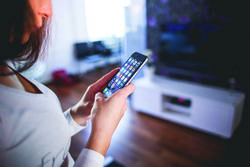As a society, we could sometimes use a complete disconnect with the digital world. We need to all take an unforeseen virtual hiatus from all methods of digital communication. It may be hard, but at the end of the day, disconnecting from the cyber universe we all depend on so much can be cleansing.
We always long for those text messages, phone calls, and ‘likes’ on our posts. Snapchat, Instagram, Facebook, are all things we spend hours on each day. We live in the generation of “If I didn’t snap it, did it even happen?”
However, by taking the time to really disconnect you will be alarmed by how connected you are to an inanimate object. Without a phone constantly in hand, people feel as though they are missing one of their extremities, like a hand or leg. Doesn’t that sound a little insane? We should not be so connected to an object in our life, but we should be connected to those around us.
People almost use their phones as a shield. A shield that acts as a barrier to forming new relationships. A barricade that protects us from awkward interactions. Think about it. In the first moment of awkward silence amongst our friends or strangers, we instantly glance down at our phones. It’s almost become a defense mechanism or involuntary reflex in our society.
Senior marketing student Shannon Christie shared her opinion on the subject. “I think people need to disconnect from their phones because it takes away from personal relationships. We should know about people’s lives and events happening in them through their own mouths rather than what is posted on social media. I think relationships would benefit from interpersonal communication rather than what we see through social media,” she said.
We are beginning to depend on the connections that we build virtually rather than in person. This dependency has weakened our ability to build relationships with substance.
Face-to-face communication allows for the progression of certain relational elements that are simply impossible to experience virtually. Eye contact, a hug, a handshake, or even a kiss are acts that awaken feelings that could never be communicated digitally.
But today we are often more concerned with staying connected to our 500 Facebook “friends” rather than the individuals that make up our physical world. We are missing out on the possible relationships that could be formed from extemporaneous conversations.
This may be a generalization, but we are so concerned with constructing our virtual identities, that we neglect our physical presence. We do things for the ‘likes,’ the comments that lack substance, and the gratification from others that our lives are meaningful and interesting.
But in turn, we become less interesting when we’re constantly on our phones constructing these virtual identities. So, the lesson here is to do things for yourself and not for validation from others, whether that is in terms of virtual validation or real life.
Junior education and anthropology student Alyssa DellaVecchia shared her expierence. “I just spent my spring break volunteering in Guatemala and I found it important to be off of my phone for nine days. It gave me the chance to connect with new people. None of us were focused on our phones, instead we were focused on being in the present. I think that all college students would benefit from doing something like this because we are so reliant on our phones and catching up on each others social medias rather than living in the present and being with one another.”
When first putting down your phone, your panic will probably settle in, You will need to accept that you won’t have your phone any time soon. But then, you will begin to feel an overwhelming sense of calmness. There won’t be any texts to be answered, posts to be written, or emails to be responded to. In your state of disconnect, you can truly embrace moments of solitude without interruption.
Without social media, you may expierence some FOMO “fear of missing out” when it came to staying up-to-date but you will come to realize that everything of value and importance is in the physical world. Quite frankly it doesn’t matter who posted an adorable photo of their dog or a shared a hilarious meme on their wall.
You will also realize how much our phones suck up so much of our time. If you ever say to yourself, “There just aren’t enough hours in the day,” well, there are actually but it doesn’t seem that way when you spend four hours of your day mindlessly scrolling through your newsfeed. Imagine what you could appreciate and how much you could do if you just looked up.
However, sometimes its unrealistic to truly be disconnected, and that okay. Let’s face it. In today’s world, we need technology to stay connected and even advance professionally. We are a society that is built upon technological communication, but we need to recognize that our dependence on these objects have weakened some of our innate human abilities.
Professor and graduate faculty in English Heide Estes Ph.D. shares her opinion. “It makes me sad when I walk into a classroom on the first day and everyone is looking down at their phones instead of talking to each other, that is the time when you are supposed to be making friends. I don’t think phones and social media are necessarily always bad because they provide a way for people to connect with one another in a way that generations before couldn’t. However, there is value in being present with people and the world you,” she said.
A physical smile will never truly be captured with a smiley face emoji, and texting abbreviations, such as a “lol” will never reflect an actual laugh. Rather than constantly looking down at our phones and conveying our emotions through the use of emojis, let’s actually speak to one another and stop allowing technology do all the work.
After all, appreciating the magic that surrounds you is almost impossible to do when you’re not looking up.
PHOTO TAKEN from Pexels.com



